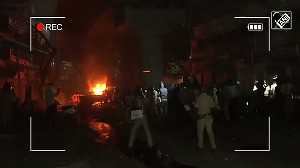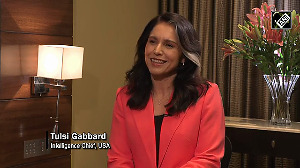It has been a little over a quarter of a century since A K Antony parted ways with Indira Gandhi in the Congress split that followed the Emergency. One may argue that it was the right decision at the time, but the experience was apparently so traumatic that Antony decided that he would never again place anything above the party's interests. The desperate desire to maintain the unity of the party at all costs led Antony to sacrifice his principles rather than have Karunakaran carry out his threat to break the Congress. Until, inevitably, matters got out of hand and Antony was forced to quit the chief minister's chair.
It amazes me to remember that the Congress-led United Democratic Front won 100 seats in the 140 strong Kerala assembly as recently as 2001. How on earth did they mismanage the situation so badly that the Congress failed to win any of the 17 Lok Sabha seats it contested in the state? Political bungling is part of the answer, of course, but that is not the whole story. The two major non-Congress components in the United Democratic Front (the Muslim League and the Kerala Congress) also did rather badly in the general election.
Going through the election returns you get the impression that there is a lot of churning in Kerala society, a phenomenon overshadowed by the political drama. The sectarian parties, which is what the Muslim League and the Kerala Congress really are, are beginning to lose their iron grip over their constituents. And that, to my mind, is a very healthy development.
The identification of the Muslim League with Islam was so great that it was possible for Muslim voters to elect an MP from Kerala who attested that his mother tongue was Arabic and not Malayalam. (I am not making this up!) Meanwhile, the various factions of the ever-bickering Kerala Congress catered to the sub-sects of the Christian community. (The array is mindboggling; there is supposed to be a village which offers over two dozen churches and chapels!)
This led to something of a quiet reaction from the Hindu voters; the supposedly atheist or 'secular' at any rate Marxists draw the bulk of their votes from the Hindus. The first to realise this was, I think, the late E M S Namboodiripad who piously announced, as far back as 1987, that his Left Democratic Front would have no truck with 'communal' forces. This immediately reduced the Muslim League's and by extension the Muslim voter's room for manoeuvre. (The Congress has always been more flexible or less principled; so much so that the current United Democratic Front set-up includes K R Gowri, someone who was one of the first Communists to become a minister.)
Don't get me wrong, the vast majority of Muslim voters continues to vote blindly for the Muslim League. But a small segment of the community has realised that it pays to have an option so that they won't be taken for granted. (The Christian community seems to have gone even further, actually electing a National Democratic Alliance candidate someone backed by the BJP to the Lok Sabha, even if meant rejecting a Kerala Congress nominee.)
Is this good or bad? In the long run, it is probably to everyone's benefit, but I fear that it could lead to turmoil in the immediate future. With institutions as with individuals, the first instinct when confronted by a setback is to seek comfort in familiar tactics. The Muslim League and the Kerala Congress tasted success by appealing to sectarian interests. I fear that they will return to their tested tactics. "Come, vote for us because only we can look after our community's interests!"
I question this casual assumption that there is anything called a 'Muslim' or a 'Christian' interest in Kerala. It is in the interests of everyone in the state to do something about the faltering quality of education, to depoliticise the administrative machinery, to retrench workers in the bloated public sector, and to reduce the state's dangerous dependence on remittances rather than investment. These are issues that are certainly not confined to any community.
But a nervous politician in search of an issue can make it appear as if a particular segment is being made a target. Several educational institutions, from primary schools all the way up to colleges, are run by Christians; I can easily imagine any attempt at reform being twisted into an "attack on minority rights".
It will take strong leadership from the Congress and the CPI-M alike to nip any such attempt in the bud. Antony's desire to keep his party united and Karunakaran's obsession with his family ensured that neither man had the time to think of the state's interests. One can only pray that Oommen Chandy does better.






 © 2025
© 2025